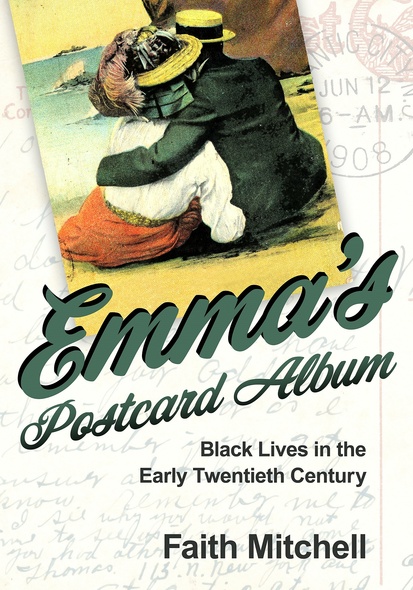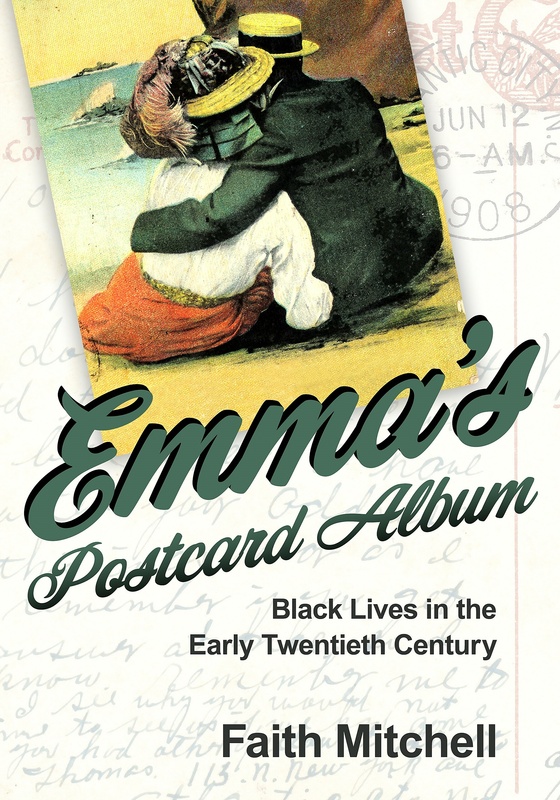
Emma's Postcard Album
Black Lives in the Early Twentieth Century
BCALA 2023 Outstanding Contribution to Publishing Citation Award winner
The turn of the twentieth century was an extraordinarily difficult period for African Americans, a time of unchecked lynchings, mob attacks, and rampant Jim Crow segregation. During these bleak years, Emma Crawford, a young African American woman living in Pennsylvania, corresponded by postcard with friends and family members and collected the cards she received from all over the country. Her album—spanning from 1906 to 1910 and analyzed in Emma’s Postcard Album—becomes an entry point into a deeply textured understanding of the nuances and complexities of African American lives and the survival strategies that enabled people “to make a way from no way.” As snippets of lived experience, eye-catching visual images, and reflections of historical moments, the cards in the collection become sources for understanding not only African American life, but also broader American history and culture.
In Emma’s Postcard Album, Faith Mitchell innovatively places the contents of this postcard collection into specific historic and biographical contexts and provides a new interpretation of postcards as life writings, a much-neglected aspect of scholarship. Through these techniques, a riveting world that is far too little known is revealed, and new insights are gained into the perspectives and experience of African Americans. Capping off these contributions, the text is a visual feast, illustrated with arresting images from the Golden Age of postcards as well as newspaper clippings and other archival material.
Awards
- , Winner - BCALA Outstanding Contribution to Publishing Citation Award
This is a powerful work of scholarship, with notes and a bibliography backing up what Emma Crawford and her brother experienced. In this book, we can see the past and the part African Americans played in it, with a vividness that both shocks and heartens.
Absolutely beautiful!
Faith Mitchell’s Emma’s Postcard Album is a stunningly original and highly compelling book, a one-of-a kind work, and an extraordinary contribution to our understanding of not only African American history and cultural studies, but also US history and American cultural studies. I know of no work of its kind for any period: an artistically presented, well-organized, deeply textured, and probing treatment of an African American family postcard collection. Mitchell vividly presents, perceptively contextualizes, and insightfully analyzes this extraordinary collection of family postcards from the early twentieth century. This artful hybrid work perceptively bridges a number of fields and categories, including the history of postcards, turn-of-the-century African American history and culture—in particular, the history of rural African Americans, and family history.
Emma’s Postcard Album offers a refreshingly different way of understanding the history of African American life in the early twentieth century. This is a subject that countless authors have written about before, of course; but to understand it by examining an individual’s surviving postcard collection offers fresh insight into the lived experience of African Americans at that time. I’ve studied the history of postcards in North America for several years now and have read many secondary works on the subject. But I cannot recall another book that uses postcards quite this way.
Emma’s Postcard Album provides an intriguing ‘gift from the past’ through insightful understandings of how postcards were the social media of the turn of the twentieth century for informed African Americans. As an anthropologist, genealogist, and now deltiologist, Mitchell artfully examines the images and reflections of life and work as her grandmother Emma and other family members circumnavigated the boundaries of structural racism as it was solidified in that Reconstruction era. The postcards illustrate how values, sense of agency, and the significance of family relations were instrumental in maintaining and nurturing African American life.
Faith Mitchell is a medical anthropologist whose career has bridged research, philanthropy, and social and health policy. In addition to numerous policy-related publications, she is author of Hoodoo Medicine: Gullah Herbal Remedies and The Book of Secrets, Part 1. Mitchell is an Institute Fellow at the Urban Institute. She and her husband live in Northern Virginia.




